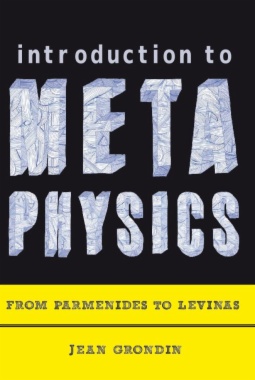Jean Grondin completes the first history of metaphysics and respects both the analytical and the Continental schools while transcending the theoretical limitations of each. He reviews seminal texts by Parmenides, Plato, Aristotle, Plotinus, and Augustine. He follows the theological turn in the metaphysical thought of Avicenna, Anselm, Aquinas, and Duns Scotus, and he revisits Descartes and the cogito; Spinoza and Leibniz's rationalist approaches; Kant's reclaiming of the metaphysical tradition; and post-Kantian practice up to Hegel. He engages with twentieth century innovations that upended the discipline, particularly Heidegger's revival of the question of Being and the rediscovery of the metaphysics of existence by Sartre and the Existentialists, language by Gadamer and Derrida, and transcendence by Levinas. Metaphysics is often dismissed as a form or epoch of philosophy that must be overcome, yet by promoting a full understanding of its platform and processes, Grondin reveals its cogent approach to reality and foundational influence on modern philosophy and science. By restoring the value of metaphysics for contemporary audiences, Grondin showcases the rich currents and countercurrents of metaphysical thought and its future possibilities.
- Table of Contents
- Preface
- Introduction
- Toward a Concept of Metaphysics
- Its Origins
- 1. Parmenides: The Evidence of Being
- The Fragmentary and Almost Incomprehensible Character of Pre-Platonic Thought
- The Context of Presocratic Thinking on Nature
- An Oral, Therefore Poetic, Culture
- A Goddess’s Revelation
- The Enigma of Being
- The Legacy of Parmenides’ Onto-Theology
- The Sophistic Crisis: Human Discourse Left to Its Own Devices
- 2. Plato: The Hypothesis of the Idea
- The Indirect Character of Plato’s Writings
- Parmenides’ Legacy
- Being Attentive to the Eidos
- The Separation of the Ideas
- An Effort at Reminiscence
- Dialectics, or Minding Being Itself
- The Exemplary Ideality of Mathematics
- The “Metaphysical” Separation of the Line: Republic VI
- The Idea of the Good’s Supereminence
- The Demiurge’s Cosmos: The Same and the Different
- The Principle of the One in Plato’s Academy
- 3. Aristotle: The Horizons of First Philosophy
- The Text and Object of Metaphysics
- A Science of First Principles
- The Theory of Causes
- It Is a Science of Being as Being
- The Onto-Theological Perspective of Metaphysics E
- The Many Meanings of Being
- First Philosophy as Ousiology: Metaphysics Z
- The Theology of Metaphysics Λ
- 4. The Last Summit of Classical Metaphysics: The Neoplatonic Eruption
- Plotinus’s Metaphysics of the One
- Augustine’s Christianization of Metaphysics
- 5. Metaphysics and Theology in the Middle Ages
- A “Metaphysical” Era?
- The Importance of Pistis
- Anselm and the Ontological Argument
- Avicenna: The Metaphysics of the Shifa
- Averroes’s Critique of Avicenna
- The Object of Metaphysics According to Thomas Aquinas
- Whether God Exists? The Five Ways
- 6. Descartes: First Philosophy According to the Cogito
- Is there a Cartesian Metaphysics?
- First Meditation: What Can Be Called Into Doubt, or Classical Metaphysics Brought Into Question
- Second Meditation: I Think, I Am - the Metaphysics of the Cogito
- Third Meditation: Concerning God, That He Exist - the Return to the Metaphysics of Divinity
- The Legacy of Descartes’s Double Metaphysics
- 7. Spinoza and Leibniz: The Metaphysics of Simplicity and Integral Rationality
- Ethical Metaphysics: Spinoza
- Leibniz and the Search for the Metaphysics of Substantial Forms
- 8. Kant: Metaphysics Turned Critical
- Natural Metaphysics
- Is Metaphysics Possible as Science?
- Kant and the Ancients' Transcendental Philosophy: Phenomena and the Things in Themselves
- Critique and Metaphysics
- The Metaphysics of Freedom
- The “Metaphysics” of the Highest Good
- Can the Existence of God Be Demonstrated?
- The Future of Metaphysics After Kant
- 9. Metaphysics After Kant?
- Was There Any Metaphysics After Kant?
- Science and System in Kant
- The Idealist Dismissal of the Metaphysics of the Thing-in-Itself
- Reinhold’s First Philosophy
- Fichte and the Metaphysics of the I
- Schelling’s Metaphysics of Identity
- The Later Schelling’s Metaphysics
- Hegel’s Philosophy of Spirit
- Post-Hegelian Metaphysics: A Primitive State or an Artistic Affair
- 10. Heidegger: The Resurrection of the Question of Being in the Name of Overcoming Metaphysics
- The Project of a Destruction of the History of Ontology
- The Twofold Priority of the Question of Being
- Metaphysics: The Experience of Our Being Par Excellence (1929)
- The Onto-Theo-Logical Constitution of Metaphysics
- The Technological and Nihilist Completion of Metaphysics
- The Unsettling of the Principle of Reason
- The Theological Scope of Heidegger's Overcoming of Metaphysics
- A Secretly Metaphysical Philosophy?
- 11. On Metaphysics Since Heidegger
- The Rediscovery of the History of Metaphysics
- The Rediscovery of the Metaphysics of Existence From Gilson to Sartre
- The Rediscovery of the Metaphysics of Language: From Gadamer to Derida
- The Rediscovery of the Metaphysics of Transcendence: Levinas
- Conclusion
- Abbreviations
- Notes
- Further Reading

